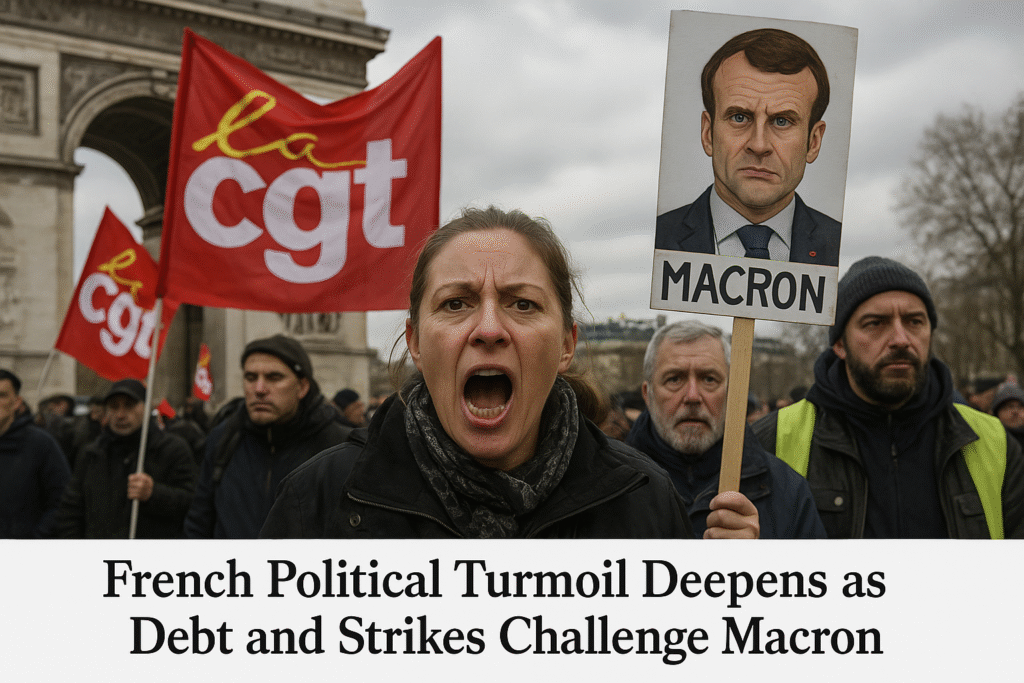By Harshit Paris, October 5, 2025 – 7:30 AM CEST
Political Instability Sparks European Attention
France’s political chaos has captured international attention this week, with neighbors in Italy observing with what newspapers described as gioia maligna—malicious joy. In less than two years, France has seen five prime ministers, a record unmatched even in post-war Italy.
The current National Assembly, reshaped after President Emmanuel Macron’s snap election in July 2024, struggles to produce a working majority capable of passing a national budget. Adding to the turmoil, unions staged a general strike on Thursday to protest previous budget proposals.
Italian outlets, particularly in Rome and Turin, highlighted the humiliation of former Prime Minister François Bayrou, spiraling national debt, and concerns over the French economy’s stability. Most of all, coverage emphasized the declining political capital of President Macron.
Debt Concerns Mount
French national debt continues to weigh heavily on the government. This year, servicing the debt is estimated at €67 billion, more than spending on any government department except education and defense. Projections suggest debt repayments could reach €100 billion annually by the end of the decade.
Last Friday, Fitch Ratings downgraded French debt, raising the potential cost of borrowing and signaling skepticism about France’s fiscal stability. Analysts warn that the government may eventually have to seek support from the International Monetary Fund or the European Central Bank.
These financial pressures are compounded by a volatile international environment, including ongoing European conflicts, reduced U.S. engagement, and the rise of populism across the continent.
Protests and Public Discontent
French citizens have taken to the streets in growing numbers. Last Wednesday, a national day of protest organized by the group Bloquons Tout (Let’s Block Everything) drew attention but little impact beyond localized clashes.
A larger test came on Thursday, with mass demonstrations led by unions and left-wing parties opposing government budget plans. Veteran political commentator Nicolas Baverez described France as “paralysed by chaos, impotence, and debt” at a critical moment for national sovereignty.
Despite these challenges, President Macron has vowed to steer the country through the crisis, though he has just 18 months remaining in his second term.
Parliamentary Gridlock
The current instability stems from Macron’s decision to dissolve the National Assembly in mid-2024. The resulting parliament is split between centrist, left-wing, and far-right factions. No single group can govern effectively without opposition support, leading to short-lived premierships.
Michel Barnier and François Bayrou each served briefly as prime minister but fell victim to the central fiscal dilemma: how to manage the state’s spending and debt. Bayrou, a 74-year-old centrist, proposed stabilizing debt repayments by cutting €44 billion from the 2026 budget, including controversial measures such as abolishing two national holidays to fund defense. His plan was rejected when left-wing and far-right MPs united against him.
Outlook
France’s situation presents two possible paths. The country could leverage its economic strength, infrastructure, and institutional resilience to weather the crisis. Alternatively, continued political gridlock, social unrest, and fiscal pressures could weaken France permanently, leaving it vulnerable to extremist influence and earning a reputation as the “sick man of Europe.”
Analysts continue to monitor Macron’s next moves and the parliament’s ability to pass key legislation, as the country faces both immediate strikes and long-term debt challenges.

